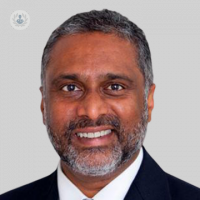Series (Part Two): GORD Diagnosis
Written by:Consultant physician and gastroenterology specialist, Dr Andrew Thillainayagam and Dr Neil Galletly, clinical research fellow, consider the impact of gastro-oesophageal reflux disease (GORD) diagnosis and how it can be managed.
In part two of this three-part series of articles, find out what’s involved in different diagnostic methods and symptoms that could indicate serious conditions.

How is GORD diagnosed?
In order to make a GORD (also known as acid reflux) diagnosis, a careful and accurate history is crucial. Heartburn is a key symptom in most patients.
It’s important to establish that heartburn is defined as a burning feeling rising from the stomach or lower chest up towards the neck rather than just using the word alone.
It’s important to differentiate between dyspepsia and heartburn. Dyspepsia is pain or discomfort centred in the upper abdomen and it may be a symptom of GORD but it is not as predominant as heartburn. Dyspepsia is usually associated with conditions such as peptic ulcer and functional dyspepsia.
Are there any symptoms of GORD that may be related to other, maybe more serious, conditions?
Most patients whose typical GORD histories are uncomplicated, initially respond to proton pump inhibitor (PPI) esomeprazole.
However, urgent endoscopy and investigation are required for the following symptoms:
- Dysphagia
- Weight loss
- Melaena or haematemesis
If symptoms settle down with treatment of acid-supressing medication, it’s most likely that the condition only extends to GORD. However, endoscopy may also be used if symptoms are unusual or slow to respond to treatment.
Are there other ways to test for GORD?
A barium swallow, also known as an esophagogram, is an imaging test for problems in the upper GI tract. However, it may not be helpful in ruling out GORD and while oesphageal strictures or deep ulceration may be seen, erosions are not shown.
If a diagnosis of GORD is in doubt after medication and endoscopy, or a diagnosis is needed to be confirmed before referral for anti-reflux surgery, ambulatory 24-hour monitoring of oesophageal pH can be done. The process involves a small catheter being placed through the nasal passage, then swallowed into the oesophagus using gulps of water. The other end of the catheter is attached to a small data recorder that is worn at waist level and held by a shoulder strap. This monitoring can show that the symptoms are related to an oesophageal pH of less that 4.0.
If you'd like to read an introductory summary of GORD, visit part one in this series or discover about everyday management of GORD in part three.
If you require top attention for your GORD, Dr Thillainayagam can help. Visit his Top Doctors profile to make an appointment, here.


